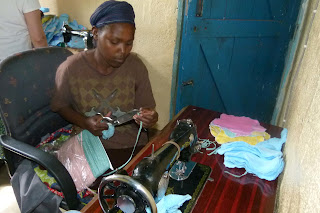OK, we're passionate about giving people a chance to make a better life. We ask lots of questions and we're a pretty quick study. Our greatest strength is understanding how little we really know.
We came to the conclusion that Eliminate Poverty Now needs a major injection of smarts about third world development. And in the last few years we've been blessed to work with people who have the technical knowledge and decades of experience to keep us moving in the right direction. So we're proud to announce the formation of the Eliminate Poverty Now Advisory Committee. It will provide guidance on development initiatives, comment on specific project proposals and help connect us to outstanding people doing outstanding work. And it's a very impressive group.
Let's start with Professor Dov Pasternak. As you know from previous posts, Dov is a world renowned agricultural scientist who holds a UNESCO World Chair in Desertification. Now in his early 70's, Dov spent the first 30 years of his career at Ben Gurion University where he and several colleagues developed drip irrigation and introduced it to many regions of the world. Over the last 10 years Dov has worked with thousands of rural farmers in West Africa to use agriculture as a path out of extreme poverty.
 |
| Dov Pasternak |
 |
| Pete Ondeng |
Our third member is Rustom Masalawala. We have known Rustom for many years and have worked closely with him in his role as Director of Business Development for the Millennium Villages Project. Rustom combines a technical background in computer science with 20 years of experience in corporate and non-profit organizations. His work with developing economies spans Africa and South Asia. In addition to his work with the Millennium Villages, Rustom was one of the first employees of the Acumen Fund, famous for their concept of "patient capital" to support promising social entrepreneurs.
The fourth member of our Advisory Committee is Yitzchak Abt. Yitzchak is one of the giants in agricultural development. He founded CINADCO (Israel's Center for International Agricultural Development Cooperation) and served as its director for 30 years. As part of MASHAV, Israel's Center for International Cooperation, CINADCO has been sharing Israel's agricultural technology with developing countries around the world for decades. Over a remarkable 40 year career Yitzchak has overseen the implementation of hundreds of projects and training for tens of thousands of people from Africa, Latin America, and Asia. Yitzchak is approaching 80, and is currently working with a number of NGOs in rural development. We're truly honored that he has agreed to serve on our Committee.
So there you have it! Our 4-member Advisory Committee comes with over 100 years of practical experience and provides us with a wide range of geographic and functional perspectives. We're truly grateful to each of them for agreeing to serve on the committee. And we're confident they will be a tremendous help in our search for partners and projects that can deliver real impact and lasting value.




































